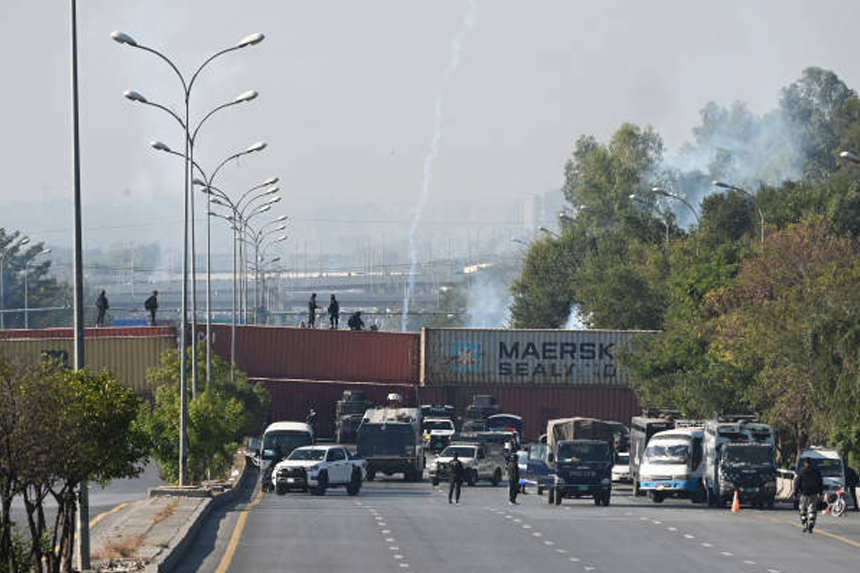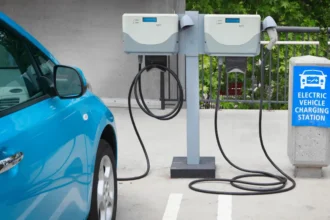As Pakistan’s security forces fight with opposition protests demanding the release of imprisoned former Prime Minister Imran Khan, at least one policeman has been murdered and more than fifty others injured. The demonstrations have escalated over the past three days while officials try to quiet them. Notwithstanding official attempts to stop them from getting to Islamabad, thousands of supporters of Khan have arrived there.
The administration has instituted a second consecutive day of lockdown in the capital, with a heavy police presence to manage the crowds. Police have blocked important highways with shipping containers to keep opposition protestors away from D Chowk, a crucial area in Islamabad near government buildings, the Supreme Court, and parliament. Many of the protesters have already been arrested.
Why, given legal challenges, does Imran Khan still enjoy broad support?
Imran Khan has been arrested on several allegations, including corruption and encouragement of violence, more than a year ago. Despite his protracted court battles, Khan is still trendy in Pakistan’s political scene. Claiming the charges against him are politically motivated, his supporters—especially those connected with his party, Pakistan Tehreek-e-Insaf (PTI)—continue to gather for his release.
Bushra Bibi and his wife, the key player in the continuous demonstrations, spoke to the gathering on Monday, encouraging them to remain determined in their quest. “We will not finish this march until Khan arrives,” she said. “You have to help me; I shall stand till my last breath. This is about my husband and this nation and its leader,” she added, energizing her supporters as the demonstrations neared the capital.
How is the police reacting to the demonstrations?
Police have been deploying tear gas in an attempt to disperse the demonstrators; they have replied by throwing stones at the cops. As the marchers headed toward the capital’s center, tensions rose, and both sides prepared for more conflicts.
According to local officials, a lot of paramilitary personnel have been sent in riot gear, and 139 persons have been arrested during the demonstrations. Along crucial points, water cannons and barriers have been positioned to prevent the crowds from advancing to important government buildings.
Starting on Sunday, the demonstrations were part of a more significant movement headed by Khan’s party, calling for a “final march” to demand his release and the undoing of what they say to be a manipulated election outcome. The administration disputes Khan and his followers’ allegation that the 2022 general election was stolen.
What Steps Authorities Are Taking to Control Rising Unrest?
The situation has gotten more unstable; the authorities have closed several Islamabad streets in preparation for the arrival of the demonstrators. The government has also suspended some online services to restrict communication among protestors and stop disseminating information that can inspire more disturbance. Schools and universities are closed as a safety measure against possible violence.
As the demonstrators have not yet reached the most critical parts of the city, some sources indicate that emotions are starting to relax even while the security forces are still handling the turmoil. Nonetheless, the situation will worsen as the march continues and the stalemate between the authorities and activists persists.
What political stakes surround Imran Khan's incarceration?
Months of demonstrations by Imran Khan’s PTI party have been calling for his freedom and rejecting the election findings. Still a major player in Pakistan’s opposition politics, Khan was removed from office in 2022 amid mounting conflict with Pakistan’s formidable military. From claims of illegally marrying Bushra Bibi to corruption and encouragement of violence, he has angrily refuted the charges against him.
“Until Khan comes to us, we will not end this march,” declared Bushra Bibi, motivating her supporters with a rebellious message. “This is about this country and its leader as much as about my husband.”
Though they did not get enough votes to form a government, independent candidates supported by PTI won the most seats in the February elections, despite Khan’s party being banned from participating in the general election earlier this year. Khan has continually charged the Pakistan Peoples Party (PPP), the Pakistan Muslim League-Nawaz (PML-N), and the ruling parties with electoral manipulation. Nevertheless, the government has vehemently refuted these allegations, writing off charges of vote manipulation as baseless.
The resolution of this political impasse could have significant consequences for the future of Pakistan’s democracy and its continuous political crises. As the situation is hot, the authorities are tightening control over Islamabad, and the demonstrations are growing.







